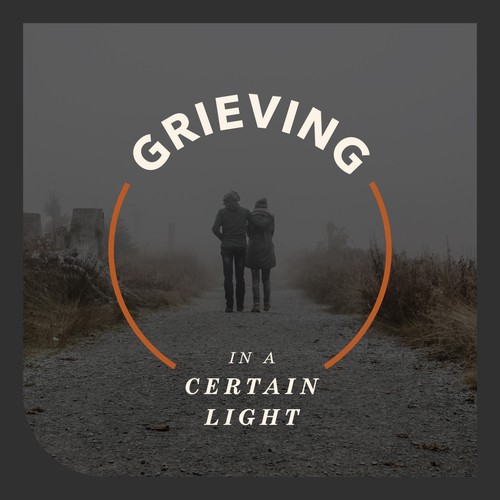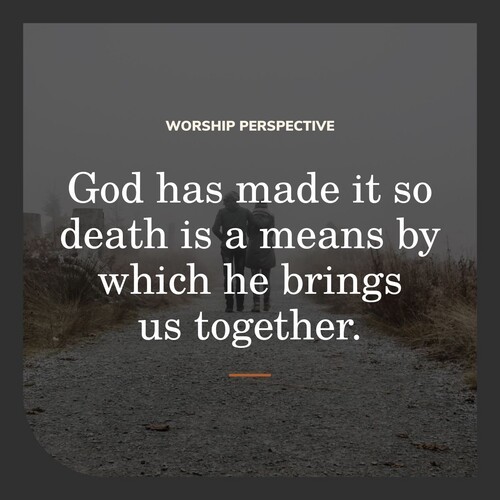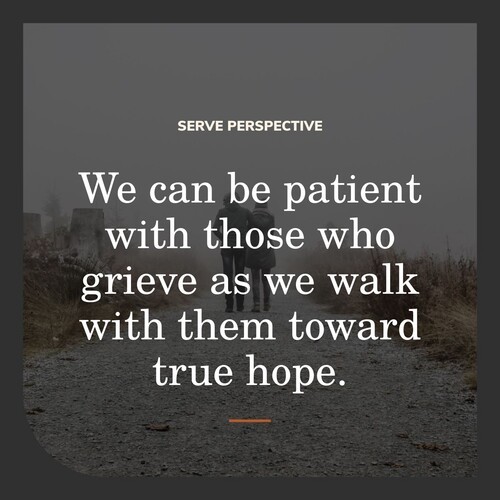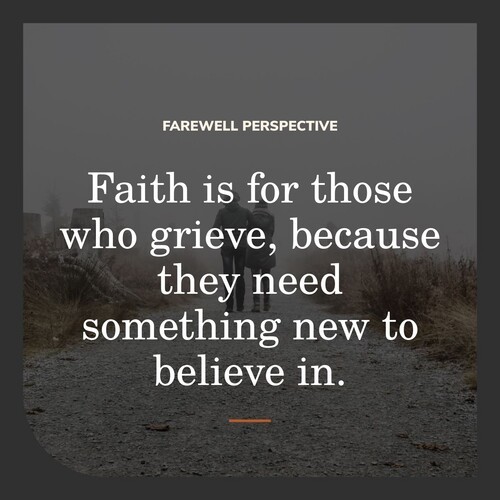May 1st, 2025
Have you ever had someone ‘read you’ so well it surprised you?

Focus 3 | Grieving is Forbearance
We grieve, in part, because what we go through in death was not meant to be. It makes us incomplete. God feels this, and he patiently bears with us as we seek his completeness in the midst of it.
Now that you've answered the icebreaker question, here's another one: this one about wearing black at a funeral.
You've reached the third part of this series!
In part one, the Spotlight focused on what makes grieving worthwhile - the fact that God comes to be with you as you grieve.
In part two, the Spotlight focused on how particular the grieving process is, and how good it is to have the kind of God who cares for you as an individual through it.
You can review the summaries of the Spotlights in this series below. For now, though, pray this prayer together as you get started:
Lord,
Help us find your grace
in the opportunity to grieve.
We may hate what has happened
and wish it could be different,
and you understand.
Thank you for making a way through
the pain of loss.
Amen.
In part one, the Spotlight focused on what makes grieving worthwhile - the fact that God comes to be with you as you grieve.
In part two, the Spotlight focused on how particular the grieving process is, and how good it is to have the kind of God who cares for you as an individual through it.
You can review the summaries of the Spotlights in this series below. For now, though, pray this prayer together as you get started:
Lord,
Help us find your grace
in the opportunity to grieve.
We may hate what has happened
and wish it could be different,
and you understand.
Thank you for making a way through
the pain of loss.
Amen.

Here are some beautiful words to get you started in this Worship section, all of which are spoken by Jesus.
Jesus spoke these words as he listened to those who were mourning and met them in their need. Some of them are words he spoke through the prophet Isaiah, and the last two lines are confirmation of this prophecy, spoken by Jesus during his time on earth.
(If you're doing the Spotlight in a group, read the words aloud, together.)

"They will be comforted."
Not "they will comfort themselves."
Not "they will get over it."
This comfort happens when someone else - someone other than the one mourning - comes to them and comforts them.
Pray about this. Assign one member of your group to read this prayer:
Blessed are those who mourn,
For God will comfort them.
Lord, let us trust in your comfort,
Let us trust in your love.
As we grieve, we feel loss,
Though we know we are blessed.
Blessed to express gratitude
For our companions on the journey.
Companions on earth,
And companions in heaven.
Blessed to know that
You have conquered death.
Blessed to hold in our hearts that
You are the Way, the Truth, and the Life.
Blessed in community
To carry one another,
To share love,
To share memories.
Now, more than ever
May we cling to the life you promise.
May we remember that,
With Your grace
We are all walking toward Your light.
With you, we are walking toward home.
Lord, bring us peace as we mourn.
Amen.
(This prayer was written by Megan Sheehan, Communications Coordinator for Campus Ministry, Marquette University.)
Jesus spoke these words as he listened to those who were mourning and met them in their need. Some of them are words he spoke through the prophet Isaiah, and the last two lines are confirmation of this prophecy, spoken by Jesus during his time on earth.
(If you're doing the Spotlight in a group, read the words aloud, together.)

"They will be comforted."
Not "they will comfort themselves."
Not "they will get over it."
This comfort happens when someone else - someone other than the one mourning - comes to them and comforts them.
Pray about this. Assign one member of your group to read this prayer:
Blessed are those who mourn,
For God will comfort them.
Lord, let us trust in your comfort,
Let us trust in your love.
As we grieve, we feel loss,
Though we know we are blessed.
Blessed to express gratitude
For our companions on the journey.
Companions on earth,
And companions in heaven.
Blessed to know that
You have conquered death.
Blessed to hold in our hearts that
You are the Way, the Truth, and the Life.
Blessed in community
To carry one another,
To share love,
To share memories.
Now, more than ever
May we cling to the life you promise.
May we remember that,
With Your grace
We are all walking toward Your light.
With you, we are walking toward home.
Lord, bring us peace as we mourn.
Amen.
(This prayer was written by Megan Sheehan, Communications Coordinator for Campus Ministry, Marquette University.)
Read this and then watch the video about how to strengthen a puzzle that's missing pieces.
(And don't set too much store on this gif. They're not going to finish the puzzle completely...which is kind of the point.)

Humanity is like a puzzle in which each person is an essential, irreplaceable piece that helps complete the whole. For this reason, death is hard to deal with because you're missing something you (and everyone) weren't designed to do without. Those who were nearest the missing piece feel the loss the most, and it's important to provide extra support to those who now have to live with an empty hole.
To compensate for this, it's vital that people encourage one another. This is why Paul wrote:
Therefore encourage one another and build one another up, just as you are doing.
1 Thessalonians 5:11
Those are words he wrote just after encouraging the Thessalonians not to grieve "like those who have no hope." Encouraging each other is like strengthening what's left of the puzzle. It's making the connection points that still exist stronger and healthier to compensate for the pieces that are missing.
This is beautifully summed up in the way the Bible uses the word Peace. (It's a pun, sure, but you see what's happening here, right? Biblical peace really does take care of the missing piece.)
Check it out:
(And don't set too much store on this gif. They're not going to finish the puzzle completely...which is kind of the point.)

Humanity is like a puzzle in which each person is an essential, irreplaceable piece that helps complete the whole. For this reason, death is hard to deal with because you're missing something you (and everyone) weren't designed to do without. Those who were nearest the missing piece feel the loss the most, and it's important to provide extra support to those who now have to live with an empty hole.
To compensate for this, it's vital that people encourage one another. This is why Paul wrote:
Therefore encourage one another and build one another up, just as you are doing.
1 Thessalonians 5:11
Those are words he wrote just after encouraging the Thessalonians not to grieve "like those who have no hope." Encouraging each other is like strengthening what's left of the puzzle. It's making the connection points that still exist stronger and healthier to compensate for the pieces that are missing.
This is beautifully summed up in the way the Bible uses the word Peace. (It's a pun, sure, but you see what's happening here, right? Biblical peace really does take care of the missing piece.)
Check it out:
Listen to this song and consider its meaning.
This isn't a worship song, per se.
It isn't a Christian song, specifically.
But it's also both worshipful and Christ-like. "Lean on Me" has struck a chord with generations of people because it speaks to something everyone needs: somebody to lean on.
As you listen to this remarkable version of the song (recorded by artists from all around the world) consider that the whole song could be the words of Jesus to you, as he says:
“Come to me, all you who are weary and burdened, and I will give you rest. Take my yoke upon you and learn from me, for I am gentle and humble in heart, and you will find rest for your souls. For my yoke is easy and my burden is light.”
Matthew 11:28–30
This isn't a worship song, per se.
It isn't a Christian song, specifically.
But it's also both worshipful and Christ-like. "Lean on Me" has struck a chord with generations of people because it speaks to something everyone needs: somebody to lean on.
As you listen to this remarkable version of the song (recorded by artists from all around the world) consider that the whole song could be the words of Jesus to you, as he says:
“Come to me, all you who are weary and burdened, and I will give you rest. Take my yoke upon you and learn from me, for I am gentle and humble in heart, and you will find rest for your souls. For my yoke is easy and my burden is light.”
Matthew 11:28–30

Observe grief through the lens of C.S Lewis and through the lens of Heath McNease.
C.S. Lewis, after watching his wife die, wrote a short book called "A Grief Observed."

The book is many things—heartfelt, powerful, fascinating—but it is meant to be, in particular, a way to observe grief. Lewis wants to provide people a way to grieve by sharing his own, giving permission to people to feel the pain that comes with loving someone and losing them in a broken world.
First, listen to artist Heath McNease as he describes it.
Artist Heath McNease wrote a song called "A Grief Observed" as an inspired tribute to the book, and reflects on the book here:
C.S. Lewis, after watching his wife die, wrote a short book called "A Grief Observed."

The book is many things—heartfelt, powerful, fascinating—but it is meant to be, in particular, a way to observe grief. Lewis wants to provide people a way to grieve by sharing his own, giving permission to people to feel the pain that comes with loving someone and losing them in a broken world.
First, listen to artist Heath McNease as he describes it.
Artist Heath McNease wrote a song called "A Grief Observed" as an inspired tribute to the book, and reflects on the book here:
Discuss: Have you ever had the experience of someone else’s expression of grief or pain helping you understand your own? If so, share it with your group. (Please?)
Now listen to the song, and as you listen, pay close attention to the pronouns in the choruses. They tell the whole story.
Now listen to the song, and as you listen, pay close attention to the pronouns in the choruses. They tell the whole story.
Everyone I've ever known
left me in my funeral clothes
with nothing but a single rose
to drop before the pall box closes,
lowered down,
lowered down.
One day I will do the same.
They beg me not to talk that way
but seconds pass and minutes fade
and time would never cower from the likes of me,
so lower it down.
Mercy on my soul!
On my soul!
On my soul!
If a coward dies a million times,
he feels the first plunge of the knife
every time he shuts his eyes
and wakes the morning with his cries,
then what am I
if not the same?
I miss her unexpectedness,
her faults and her resistances.
If God remains persistent with
the pain he brought her
how can I still pray to him?
We're not the same.
Mercy on her soul!
On her soul!
On her soul!
She said she was at peace with God
though she knew that I was not.
The chaplain gave his final thoughts,
she exhaled and then smiled...
But it was not for me.
A grief observed.
How wicked would it be for you
to wish her back now that she's through?
To pray her back once she's passed through?
A ray of light between right now and evermore...
A grief observed.
Mercy on our souls!
On our souls!
On our souls!
Mercy on our souls!
On our souls!
On our souls!
left me in my funeral clothes
with nothing but a single rose
to drop before the pall box closes,
lowered down,
lowered down.
One day I will do the same.
They beg me not to talk that way
but seconds pass and minutes fade
and time would never cower from the likes of me,
so lower it down.
Mercy on my soul!
On my soul!
On my soul!
If a coward dies a million times,
he feels the first plunge of the knife
every time he shuts his eyes
and wakes the morning with his cries,
then what am I
if not the same?
I miss her unexpectedness,
her faults and her resistances.
If God remains persistent with
the pain he brought her
how can I still pray to him?
We're not the same.
Mercy on her soul!
On her soul!
On her soul!
She said she was at peace with God
though she knew that I was not.
The chaplain gave his final thoughts,
she exhaled and then smiled...
But it was not for me.
A grief observed.
How wicked would it be for you
to wish her back now that she's through?
To pray her back once she's passed through?
A ray of light between right now and evermore...
A grief observed.
Mercy on our souls!
On our souls!
On our souls!
Mercy on our souls!
On our souls!
On our souls!
Silence the Devil and his shame.
Tragically, the devil whispers to people that their grief is shameful, weak, or foolish, and so they hide it. In doing so, they give the impression that grieving is always shameful, weak, or foolish, and instead of giving one another permission to be sad, to struggle, and to depend on each other, people feel totally alone.
The devil's lies have added the pain of shame to the pain of grief for millennia. Listen to the way Job reflects on it. Job - who lost so much, from crops to animals and even his children - knew very well the way grief is magnified by shame.
6 “God has made me a byword to everyone, a man in whose face people spit. 7 My eyes have grown dim with grief; my whole frame is but a shadow. 8 The upright are appalled at this; the innocent are aroused against the ungodly. 9 Nevertheless, the righteous will hold to their ways, and those with clean hands will grow stronger. 10 “But come on, all of you, try again! I will not find a wise man among you. 11 My days have passed, my plans are shattered. Yet the desires of my heart 12 turn night into day; in the face of the darkness light is near. 13 If the only home I hope for is the grave, if I spread out my bed in the realm of darkness, 14 if I say to corruption, ‘You are my father,’ and to the worm, ‘My mother’ or ‘My sister,’ 15 where then is my hope— who can see any hope for me? 16 Will it go down to the gates of death? Will we descend together into the dust?”
Job 17:6-16
Those who grieve with hope (like Paul encouraged the Thessalonians) don't add shame to grief. They help the grieving by inviting them to grieve with them, with hope, and with Jesus. Grieving is beneficial when it empowers others to grieve in valuable ways.
Take this further. Read this short excerpt from the book "The Soul of Desire."
(It will probably be easiest, if you have multiple phones/screens, for each group member to read on their own.)
.png)
Here's a clickable link to the excerpt (or use the QR code above)

Once you've read, discuss:
Tragically, the devil whispers to people that their grief is shameful, weak, or foolish, and so they hide it. In doing so, they give the impression that grieving is always shameful, weak, or foolish, and instead of giving one another permission to be sad, to struggle, and to depend on each other, people feel totally alone.
The devil's lies have added the pain of shame to the pain of grief for millennia. Listen to the way Job reflects on it. Job - who lost so much, from crops to animals and even his children - knew very well the way grief is magnified by shame.
6 “God has made me a byword to everyone, a man in whose face people spit. 7 My eyes have grown dim with grief; my whole frame is but a shadow. 8 The upright are appalled at this; the innocent are aroused against the ungodly. 9 Nevertheless, the righteous will hold to their ways, and those with clean hands will grow stronger. 10 “But come on, all of you, try again! I will not find a wise man among you. 11 My days have passed, my plans are shattered. Yet the desires of my heart 12 turn night into day; in the face of the darkness light is near. 13 If the only home I hope for is the grave, if I spread out my bed in the realm of darkness, 14 if I say to corruption, ‘You are my father,’ and to the worm, ‘My mother’ or ‘My sister,’ 15 where then is my hope— who can see any hope for me? 16 Will it go down to the gates of death? Will we descend together into the dust?”
Job 17:6-16
Those who grieve with hope (like Paul encouraged the Thessalonians) don't add shame to grief. They help the grieving by inviting them to grieve with them, with hope, and with Jesus. Grieving is beneficial when it empowers others to grieve in valuable ways.
Take this further. Read this short excerpt from the book "The Soul of Desire."
(It will probably be easiest, if you have multiple phones/screens, for each group member to read on their own.)
.png)
Here's a clickable link to the excerpt (or use the QR code above)

Once you've read, discuss:
- Were there parts of the excerpt that didn't make sense to anyone? Can you help one another understand them? (It's a dense read - it's OK for it not all to make sense in this first go.)
- Share what you found most interesting/helpful about the article.
- As a group, work together to come up with five examples of things one might say to someone grieving that would be unhelpful. Specifically, things that would make them ashamed to share their grief.
- As a group, work together to come up with five better things to say—ways to connect with someone about their grief that give them permission to grieve and bind the two of you together. Please share those five examples with others who do this Spotlight by posting them in the comments below.

Take 4–5 minutes to construct a sharable story of your own grief.

Go through this exercise now so that when you have the opportunity to give others permission to grieve, you are ready to articulate what that has done for you in your own life.
Use this outline to construct a story about a time you grieved and were comforted in that grief, then partner up and share.
Once you've shared, offer feedback. Here are a few principles for giving each other good feedback:

Go through this exercise now so that when you have the opportunity to give others permission to grieve, you are ready to articulate what that has done for you in your own life.
Use this outline to construct a story about a time you grieved and were comforted in that grief, then partner up and share.
- In my life, __________ happened that caused me to grieve.
- There were people who were helpful to me in this grief. Their names are __________.
- They helped me by __________.
- My particular experience with grief has equipped me to serve others who are grieving. I can offer them __________.
Once you've shared, offer feedback. Here are a few principles for giving each other good feedback:
- Demonstrate that you listened and understood what your partner was getting at.
- Find something about their approach that resonated with you.
- Make an assertion about what you think they were trying to say.
- Give feedback (in the form of open-ended questions, or perhaps, with specifics) about how they could have accomplished it more effectively.
Feel free to submit a prayer request by filling out the below form.
(If you choose to make your request public, you'll see it display in the Current at the end of the Spotlight along with anyone else who did the same.)
(If you choose to make your request public, you'll see it display in the Current at the end of the Spotlight along with anyone else who did the same.)
Pray through your requests—together—as a group.
After submitting your requests in the above form, take some time to share with your group whatever requests the group might have for this week.
After submitting your requests in the above form, take some time to share with your group whatever requests the group might have for this week.

Listen to Abide With Me in a new way.
Abide With Me is a powerful hymn that is designed to offer comfort in death. As you use it for a closing prayer today, remember also that God often shows himself to you through others. Those who have comforted you in your phase of grieving have been God's way of abiding with you, and when you do the same for others, you become God's abiding love to them.
As you watch this video, notice two things:
Abide With Me is a powerful hymn that is designed to offer comfort in death. As you use it for a closing prayer today, remember also that God often shows himself to you through others. Those who have comforted you in your phase of grieving have been God's way of abiding with you, and when you do the same for others, you become God's abiding love to them.
As you watch this video, notice two things:
- The "curving outward" that was illustrated through the "mercy on MY/HER/OUR soul" in A Grief Observed is visually represented here.
- It's difficult to put into totally sufficient words what grieving in a certain light means, but what happens in this video is a pretty good artistic take on it!

Let's wrap things up by taking a look at what's Current at Illume.
Tap on the buttons in the frame below to see what’s currently happening at Illume—information on everything from current and upcoming online content to live events and opportunities to serve in the community can all be found here.
Tap on the buttons in the frame below to see what’s currently happening at Illume—information on everything from current and upcoming online content to live events and opportunities to serve in the community can all be found here.
Posted in Grieving in a Certain Light

No Comments